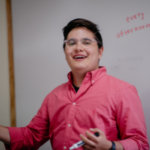The Peoplehood Orientation understands rabbinic literature (defined broadly) as a tool for nurturing a sense of peoplehood, using methodologies that cultivate this sensibility. As R’ Soloveitchik offers in his picture of bet midrash learning, studying rabbinic literature enables “a symposium of generations [to come] into existence.” A Peoplehood Orientation recognizes Torah — especially when taught with commentary — as a central tool through which peoplehood is constructed, and therefore rabbinic literature is taught using modalities that enable learners to connect with themselves more deeply as part of the broader collective of Jewish people through this Orientation. Learners are encouraged to develop personal relationships with commentators, sages, and figures found within ancient texts, and to understand texts as a portal to the worlds in which our ancestors lived. If klal yisrael is to survive this next chapter of Jewish history, we must (re)turn to and recover authentic entities around which our people can coalesce as a collective. I suggest that perhaps we return to Torah, the project that not only initially forged us as a collective but also carried us — and continues to carry us — through diaspora.
Peoplehood Orientation: Nurturing Klal Yisrael Through Torah Study
More PEDAGOGIES RESOURCES
Anava/Humility as a Pedagogy Toward Jewish Peoplehood
Rabbi Aytan Kadden
Teacher and Leadership Team Member
Ort Pelech Boys High School
The pedagogy of humility as taught using chevruta.
Access ResourceKaveh: A Pedagogy of Hope
Rabbi Amitai Fraiman
Director, The Z3 Project
Oshman Family JCC
The pedagogy of hope aims to embody the role of hope in Jewish peoplehood and create a shared consciousness.
Access ResourcePedagogy of Rootedness: Retrieving Rootedness and Building a Sense of Belonging
Dr. Dominika Zakrzewska Oledzka
Program Director
Living Bridge Institute for Intercultural & International Affairs
The pedagogy of rootedness stresses the importance of being aware of one’s heritage to create a sense of belonging and connection.
Access ResourceZakhor: A Pedagogy of Memory
Dr. Samantha Vinokor-Meinrath
Managing Director of Identity, Ideas and Adolescents
The Jewish Education Project
Zakhor is a pedagogy of memory through storytelling and embodied experiences.
Access ResourceThe Pedagogy of Storytelling
Bezawit Abebe
Research Fellow
Be'chol Lashon
The pedagogy of storytelling engages and connects both the storyteller and listener.
Access ResourceThe Story of Israel Through Hasidic Storytelling: Bridging Reality and Hope
Dr. Yakir Englander
Senior Director of Leadership
Israel American Council (IAC)
Learning to tell one’s own Israel story using the Hasidic storytelling tradition.
Access Resource